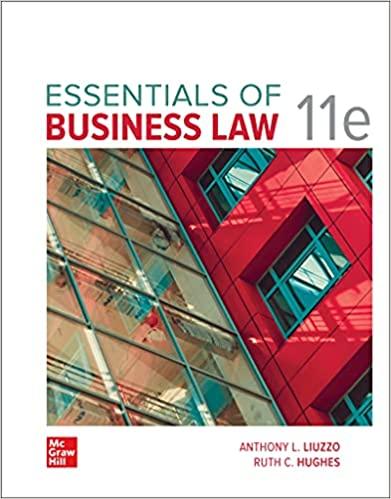Question
Objective: To write a business letter to your future co-founder of a new business explaining the most advantageous form of business entity from a legal
Objective: To write a business letter to your future co-founder of a new business explaining the most advantageous form of business entity from a legal perspective.
Presentation: Your submission is to be typed using proper grammar and spelling. Please use Times New Roman font with a font size of 12. Margins should be 1" all around. Length should not exceed three pages.
Content: You and your friend have developed a promising business idea.Over coffee, your friend asks you to be business partners in this opportunity.You respond with caution: "Who else would I go in on this idea with?But I would like to explore which type of business entity would work best for us in order to move forward appropriately."
Write a business letter to your friend explaining which business entity, from a legal perspective, would be most advantageous for you both.State your reasons clearly, weighing the pros/cons of your selection.
If you select a partnership, please explain which type of partnership you select and the reasons why.Also, please compare/contrast that partnership structure with a runner-up form of business entity (e.g. an LLC or corporation).
If you select another form of business entity over partnership, please explain why.Please compare/contrast the selected structure with a general partnership.
Your letter should address the following three legal considerations:
(1)ownership and control - what level of control is desired and which entity most appropriately meets that desire?
(2)legal liability - what is the desired level of exposure to legal and financial liability and which entity best protects you?
(3)exit and transferability - all good business plans must be developed with an exit plan in mind - how will you expect to transfer your interest (do you desire flexibility) and which entity best meets those expectations?
Your letter need not address business formation costs, taxation advantages/disadvantages, capitalization ratios, or other accounting reasons.However, if you do address these topics, you may be eligible to receive extra credit but it depends on whether the first three considerations were addressed to the satisfaction of the professor in accordance with the grading rubric.
Step by Step Solution
There are 3 Steps involved in it
Step: 1

Get Instant Access to Expert-Tailored Solutions
See step-by-step solutions with expert insights and AI powered tools for academic success
Step: 2

Step: 3

Ace Your Homework with AI
Get the answers you need in no time with our AI-driven, step-by-step assistance
Get Started


